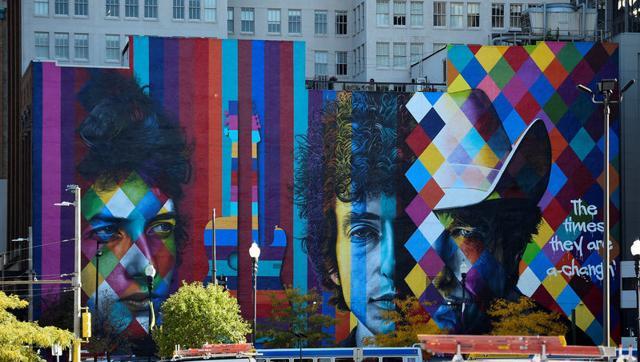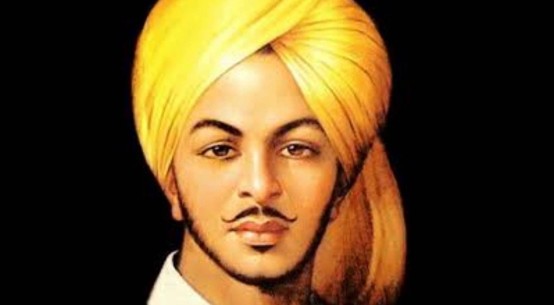
When Dylan toured America during the Watergate scandal in the seventies, the biggest applause he got each night was when he sang the words “even the President of the United States sometimes must have to stand naked.” That was already a decade after he wrote that song. But this week as we watch the US presidential debates with their lies and their abuse and their allegations, those words still haunt America. Because Dylan gave the world the right advice, way back in 1965: “Don’t follow leaders. Watch the parking meters.” Valid then. More valid now.
So did Bob Dylan really deserve the 2016 Nobel Prize for Literature? The Nobel committee said he was given the award for “having created new poetic expression within the great American song tradition”. This led to the first controversy. Had he, in fact, transformed the pop song tradition? The author Joyce Carol Oates said that while she respected Dylan, the award should have gone to the Beatles instead. This was an intuitively appealing view but it missed the point. When Dylan produced what was probably one of the greatest rock albums ever, Blonde on Blonde, in 1966, the Beatles were still charting with Paperback Writer and other forgettable pop songs. As John Lennon himself said, he altered his approach to lyrics only after hearing Dylan. The Beatles changed pop. But Dylan changed the way lyrics were written. As Bruce Springsteen writes in his recent autobiography about the early Dylan albums, “They were not only great records, but they were the first time I can remember being exposed to a truthful vision of the places I lived. The darkness and the light were there, the veil of illusion and deceptions ripped aside.” Till Dylan came along, most songwriters were still rhyming “moon” with “June” and shying away from putting raw emotion into their lyrics. Even the folksingers of the New York folk scene Dylan briefly inhabited in the early 60s wrote protest songs that fitted neatly into an older folk tradition. Only Dylan had the nerve — and the genius — to invent a new idiom. Which leads to the second controversy: Is what Dylan does literature? Many critics have dismissed him with faint praise. He is a great songwriter, they say, but he is a popular artiste, not a man who is interested in — or capable of — producing literature. In a sense, the Nobel committee anticipated that criticism in its citation when it talked about “poetic expression” within the song tradition; obviously the committee believes that great songs can be poetry and literature. But is the committee right? Do great songs count as literature? Jodi Picoult, an American author of bestsellers, asked snidely “I’m happy for Bob Dylan. #But DoesThisMeanI CanWinAGrammy?” Writing in The New York Times, Anna North said “Mr Dylan’s writing is inseparable from its music. He is great because he is a great musician, and when the Nobel committee gives the literature prize to a musician, it misses the opportunity to honor a writer.” Those views may have been valid when literature only meant novels or volumes of poetry. But one of Dylan’s contributions has been to break down the barrier between traditional “literature” and popular music. It’s all very well to say that his “writing is inseparable from his music.” But that discounts the manner in which so many of his words have passed into popular usage (”Don’t criticize what you can’t understand”, “he not busy being born is busy dying”, “you don’t need a weatherman to know which way the wind blows”, “may you stay forever young” etc) to the extent that many people who repeat them don’t even know the songs they came from
To say that his words don’t constitute poetry because they came from songs is like saying that the best lines in Shakespeare can only be judged as dialogue within a play. And then there are the themes. All great literature must have the ability to rise above its times. When Dylan started out in the 60s he was hailed as a spokesman for his generation. But over five decades later, Dylan’s words seem once again to capture the mood of our times. He first wrote in an era of inequality, when young people felt alienated and let down by their leaders. He wrote about the pointlessness of war and the need for a generational change. In a way that nobody could ever have foreseen, all the old songs are eerily relevant again. Listen to ‘Blowin’ In the Wind’ and think of the mayhem and murder in West Asia. Put on ‘The Times they Are A’changing’ and think of the way in which millennials are deserting the political system. Watch Vladimir Putin on TV as he plans more airstrikes and more invasions and listen to ‘Masters of War’ right after that. Watch Wall Street dominate the world economy and think of that line from ‘It’s Alright Ma’: “money doesn’t talk, it swears”. When Dylan toured America during the Watergate scandal in the seventies, the biggest applause he got each night was when he sang the words “even the President of the United States sometimes must have to stand naked.” That was already a decade after he wrote that song. But this week as we watch the US presidential debates with their lies and their abuse and their allegations, those words still haunt America. Because Dylan gave the world the right advice, way back in 1965: “Don’t follow leaders. Watch the parking meters.” Valid then. More valid now.



